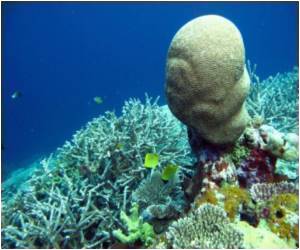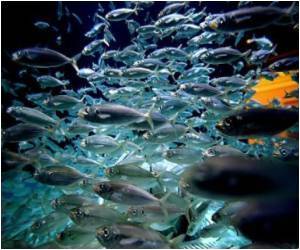
Coral reef habitat studies have found that CO2-induced behavioral changes, similar to those observed in the new study, increase mortality from predation by more than fivefold in newly settled fish.
Fish can smell a fish that eats another fish and will avoid water containing the scent. In Dixson's laboratory experiments, control fish given the choice between swimming in normal water or water spiked with the smell of a predator will choose the normal water. But fish raised in water acidified with carbon dioxide will choose to spend time in the predator-scented water.
Juvenile fish living at the carbon dioxide seep and brought onto a boat for behavior testing had nearly the identical predator sensing impairment as juvenile fish reared at similar CO2 levels in the lab, the new study found.
The fish from the bubble reef were also bolder. In one experiment, the team measured how far the fish roamed from a shelter and then created a disturbance to send the fish back to the shelter. Fish from the CO2 seep emerged from the shelter at least six times sooner than the control fish after the disturbance.
Despite the dramatic effects of high CO2 on fish behaviors, relatively few differences in species richness, species composition and relative abundances of fish were found between the CO2 seep and the control reef.
Advertisement
The researchers did find that the number of large predatory fishes was lower at the CO2 seep compared to the control reef, which could offset the increased risk of mortality due to the fishes' abnormal behavior, the researchers said.
Advertisement
"Whether or not this sensory effect is happening generationally is something that we don't know," Dixson said.
The results do show that what Dixson and colleagues found in the lab matches with what is seen in the field.
"It's a step in the right direction in terms of answering ocean acidification problems." Dixson said. "The alternative is just to wait 100 years. At least now we might prepare for what might be happening."
Source-Eurekalert










